How to Protect Personal Data In today’s world, your personal info is just a click away. It’s more important than ever to know how to protect it. The Internet is a big part of our lives, and keeping your data safe can be tough. This article will share key tips to keep your personal info safe from hackers and data breaches.
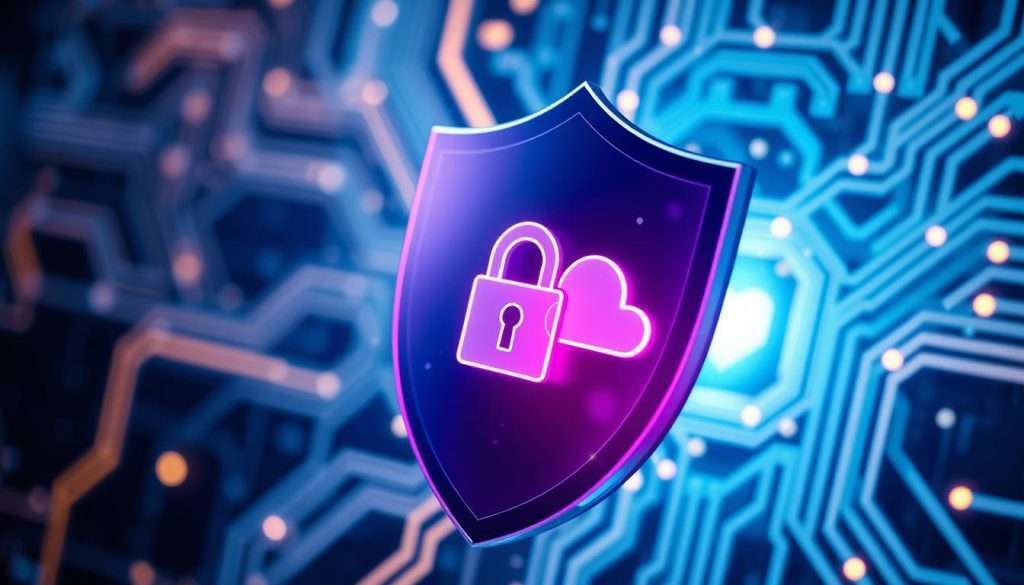
Key Takeaways
- Understanding the importance of personal data security is essential in today’s digital age.
- Implementing effective online privacy protection strategies can safeguard your information.
- Acknowledging different data protection measures enhances your defense against data breaches.
- Regularly updating your security practices ensures you stay one step ahead of cyber threats.
- Using secure networks and applications is fundamental to protecting personal data.
Understanding Personal Data and Its Importance
Personal data security is about protecting any information that can identify you or show what you do. This includes basic details like your name and address, as well as private information like your social security number and online purchases. Understanding the value of your data is the first step toward ensuring personal data security.
With the rise in data breaches and cybercrimes, the importance of personal data security has become more evident. When you’re online, take steps to safeguard your sensitive information and make informed choices about what personal data you share.
To understand why personal data is so important, look at this table. It shows different kinds of personal data and why they matter:
| Type of Personal Data | Examples | Implications of Exposure |
|---|---|---|
| Identity Information | Name, Social Security Number | Identity theft, fraud |
| Contact Information | Address, Email, Phone Number | Unwanted solicitation, stalking |
| Financial Information | Bank account details, Credit card numbers | Unauthorized transactions, financial loss |
| Online Activity Data | Browsing history, Location data | Targeted advertising, privacy invasion |
Protecting your data is not just a precaution. It’s a way to take care of yourself online. By keeping your personal info safe, you stay in control of your identity. This helps prevent problems from data breaches.
How to Protect Personal Data
Learning to protect personal data starts with knowing what’s sensitive. It involves prioritizing the most critical information. Creating strong passwords is key, as they block unauthorized access.
Identifying Sensitive Information
It’s vital to know what sensitive information is. This includes things like Social Security numbers, financial info, and health records. Understanding this enables you to implement stronger security measures for the appropriate data.
Think of your data in three groups:
- Exceedingly Delicate: Social Security numbers, bank account subtle elements, and passwords.
- Moderately Sensitive: Email addresses, phone numbers, and home addresses.
- Low Sensitivity: Public information and general contact details.
Implementing Strong Passwords
Strong passwords are a big part of keeping your data safe. Here are some data security tips for making good passwords:
- Incorporate a combination of capitalized and lowercase letters, numbers, and uncommon images.
- Refrain from using common words or easily guessable details like birth dates.
- Create a unique password for each account to avoid a chain reaction in case one gets compromised.
- Regularly update your passwords every three to six months to enhance security.
- Use password management tools to keep complex passwords safe.
For extra security, turn on two-factor authentication. This extra step keeps your data safe even if a password is stolen.
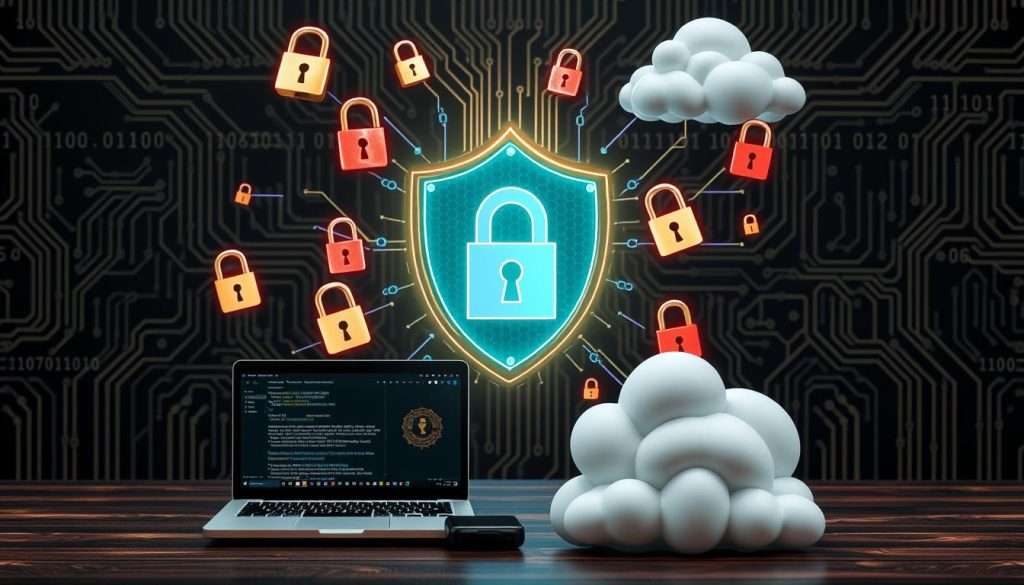
The Role of Data Encryption Methods
Understanding data encryption is key for keeping personal info safe. It turns information into a code that as it were the correct key can open. This serves as an effective safeguard against hackers.
What is Data Encryption?
Data encryption makes information safe by coding it. It can only be accessed by individuals possessing the correct key. There are many ways to encrypt data, like:
- Symmetric encryption: Uses one key for both coding and decoding.
- Asymmetric encryption: Uses two keys, one for coding and the other for decoding.
These methods keep data safe, whether it’s stored or being sent. Using them helps protect your privacy and keeps your data safe from hackers.
Benefits of Using Encryption for Personal Data
Encryption offers more than just safety. Here are some benefits:
- Data confidentiality: It keeps your personal data safe, making it unreadable to others.
- Integrity assurance: It makes sure your data stays the same while it’s being sent.
- Compliance support: Many laws require encryption to protect data, helping you follow them.
- Increased trust: People trust companies more when they protect their data well.
Using good encryption methods makes your online data much safer. It helps create a more secure internet for everyone.
Effective Online Privacy Protection Strategies
Protecting your personal information online is essential in today’s digital era. You can boost your online safety with simple steps like using secure browsers and VPNs. These tools help keep your identity hidden and your data safe.
Using Secure Browsers
Secure browsers like Mozilla Firefox and Brave focus on your privacy. They block trackers and offer strong privacy settings. This lowers the chance of your data being collected without your consent.
They have cool features like:
- Built-in ad blockers that stop annoying ads.
- Enhanced cookie management to control tracking better.
- Improved security protocols to keep your connection safe.
Choosing secure browsers is a big step in protecting your online privacy and keeping your personal data safe.
Utilizing VPNs for Online Privacy
VPNs (Virtual Private Networks) are great for boosting your online privacy. They encrypt your internet connection, making it hard for others to see what you’re doing online. This is especially useful on public networks, where data snooping is more common.
Using a VPN gives you:
- Concealing your IP address allows you to browse the internet privately.
- Accessing restricted content safely and securely.
- Preventing data leaks that could reveal sensitive info.
Adding a VPN to your online routine can help protect your privacy and make your internet experience safer.

Data Protection Tips for Social Media
Social media has become deeply integrated into our daily routines. But, we must protect our personal data. It’s important to set your privacy settings right. Knowing about scams and phishing can help keep you safe. Here are some key tips to follow.
Adjusting Privacy Settings
Make sure to check your privacy settings on sites like Facebook, Instagram, and Twitter. These platforms let you control who sees your posts and info. Here are some tips for adjusting your settings:
- Make your profiles private so only friends can see your stuff.
- Choose who can see your posts, past and future.
- Check your friend list often to keep it clean and safe.
Becoming Aware of Scams and Phishing
It’s important to know about scams and phishing on social media. Fraudsters often attempt to deceive you into sharing your personal information. Here are some tips to stay safe:
- Don’t trust messages that ask for personal info or money.
- Always check who’s asking for something before you respond.
- Tell the platform if you see any suspicious accounts or messages.
Implementing these suggestions can help you navigate social media securely. You’ll keep your personal info protected from harm.
| Privacy Setting | Benefit |
|---|---|
| Private Account | Limits content visibility to approved followers only |
| Audience Restrictions | Controls who can see past and future posts |
| Friend List Audits | Ensures a trusted circle of connections |
Secure Data Management Practices
Keeping your personal info safe is key. Regular steps like software updates and backing up data are vital. They help protect your information and keep it secure.
Regularly Updating Software and Applications
Keeping your software up to date is crucial. Updates often fix security holes, making your systems safer. If you don’t update, you risk being hacked.
Setting your updates to automatic is a smart move. It keeps your apps safe without you having to do much.
Backing Up Your Data Securely
Backing up your data is a must. Here are a few methods to ensure it is done securely:
- Cloud solutions that encrypt your data.
- External hard drives with strong security.
- Encrypted backup services for extra safety.
These steps help you get your data back if it gets lost or stolen. Backing up regularly keeps your info safe and sound.
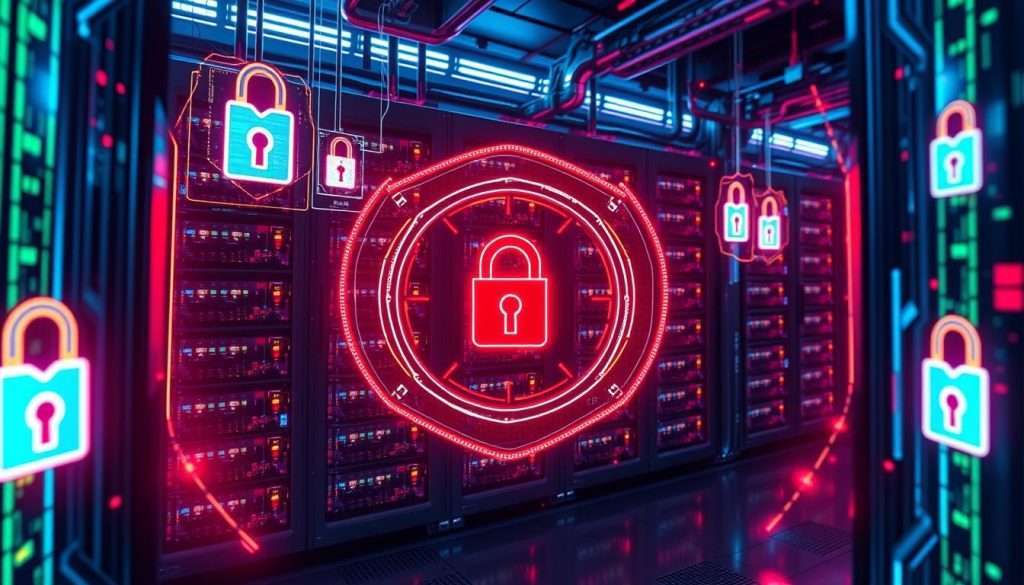
| Backup Method | Security Level | Accessibility |
|---|---|---|
| Cloud Solutions | High | Accessible from any device |
| External Hard Drives | Moderate | Requires physical access |
| Encrypted Backup Services | Very High | Accessible with proper credentials |
Data Security Measures at Home
Keeping your personal info safe at home is key. By using strong data security steps, you can block unwanted access and cyber threats. Make sure your home Wi-Fi and firewalls are up to the task.
Securing Your Home Wi-Fi Network
First, update your router’s settings. Change the default username and password to something harder to guess. Here are some tips:
- Choose a strong Wi-Fi password, with letters, numbers, and symbols.
- Hide your Network Name (SSID) so others can’t see it.
- Use the latest encryption, like WPA3.
Using Firewalls for Additional Protection
Firewalls block threats from reaching your network. You can use either hardware or software firewalls. Here’s what to know:
- Hardware firewalls protect your whole network, built into routers.
- Software firewalls give you control over each device.
- Keep your firewall settings updated to fight new threats.
Focus on securing your home Wi-Fi and using firewalls. This builds a strong defense for your data. Take these steps to make your digital space safer.
Best Practices for Mobile Device Security
In the modern digital age, safeguarding your mobile device is essential. Smartphones hold a lot of personal data. So, it’s important to follow best practices to keep your info safe from hackers and threats.
Screen Lock and Authentication Options
Using strong screen lock options is a basic step in keeping your device secure. You can pick from many methods to make sure only you can get into your phone.
- Pattern Lock: A visual approach where you draw a specific pattern to unlock your device.
- PIN Code: A numerical code that you enter to gain access.
- Biometric Authentication: Fingerprint or facial recognition offers a quick and secure way to unlock your device.
Choosing a solid security method greatly lowers the chance of unauthorized access.
Installing Security Apps
Another crucial step is to install top-notch security apps. These apps protect against many dangers, like:
- Malware
- Phishing attempts
- Vulnerabilities that can lead to data breaches
Apps like Norton Mobile Security, Bitdefender Mobile Security, and Avast Mobile Security offer great protection.To ensure your device’s safety, always download apps from reliable and secure sources.
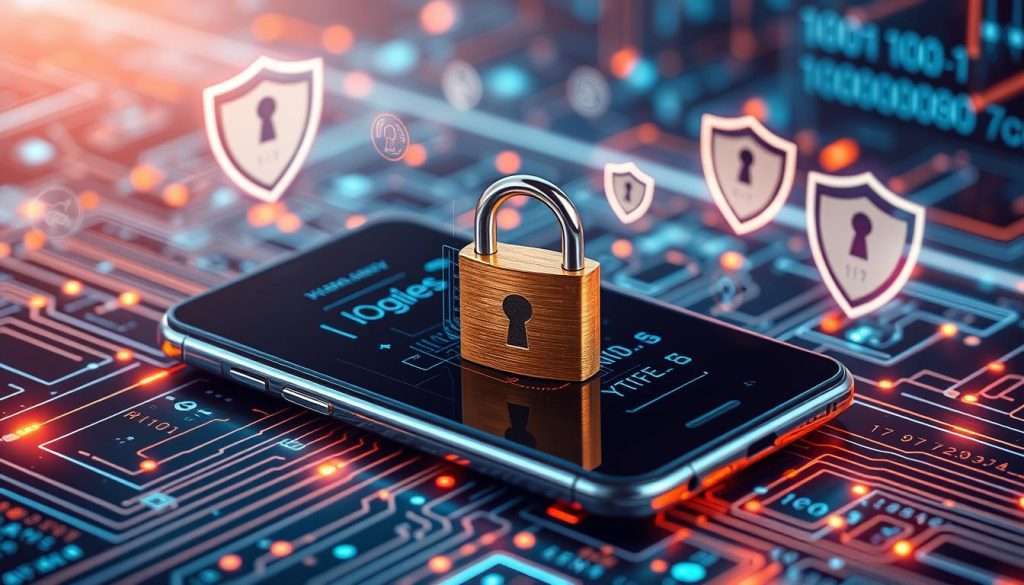
Preventing Data Breaches: What You Can Do
In today’s digital world, it’s key to stay ahead of threats. Regularly check your financial and online accounts for odd activity. This is how you keep your personal info safe.
Monitoring Your Accounts Regularly
Make it a habit to check your accounts often. This includes bank accounts and online services. Watch for unauthorized transactions or profile changes you didn’t make.
Setting up alerts for odd activity is a big help. Quick alerts let you act fast, preventing bigger problems.
Understanding the Signs of a Data Breach
Knowing the signs of a breach is crucial. Look out for unexpected password resets, account lockouts, or odd login requests. Be wary of emails or messages that request personal or sensitive information.
Being informed helps you act fast. Regular monitoring and awareness of threats protect your personal info.
Cyber Security Measures for Safe Browsing
It’s crucial to know about cyber security to stay safe online. This is especially true when you’re browsing or doing sensitive transactions. By following safe browsing tips, you can lower the risk of data breaches and online theft.
Avoiding Public Wi-Fi for Sensitive Transactions
Doing things like online banking or shopping on public Wi-Fi can put your personal info at risk. Public Wi-Fi is often not secure, making it a target for hackers. Always use mobile data or a private network for sensitive activities. If you need to connect to public Wi-Fi, using a VPN can safeguard your data.
Recognizing Secure Websites
One key safe browsing tip is to check if websites are secure. Choose websites with URLs starting with HTTPS rather than HTTP for added security. A padlock icon next to the website’s address means it’s secure. This shows the site uses encryption to keep your data safe. Being careful about these signs helps you stay safe online.
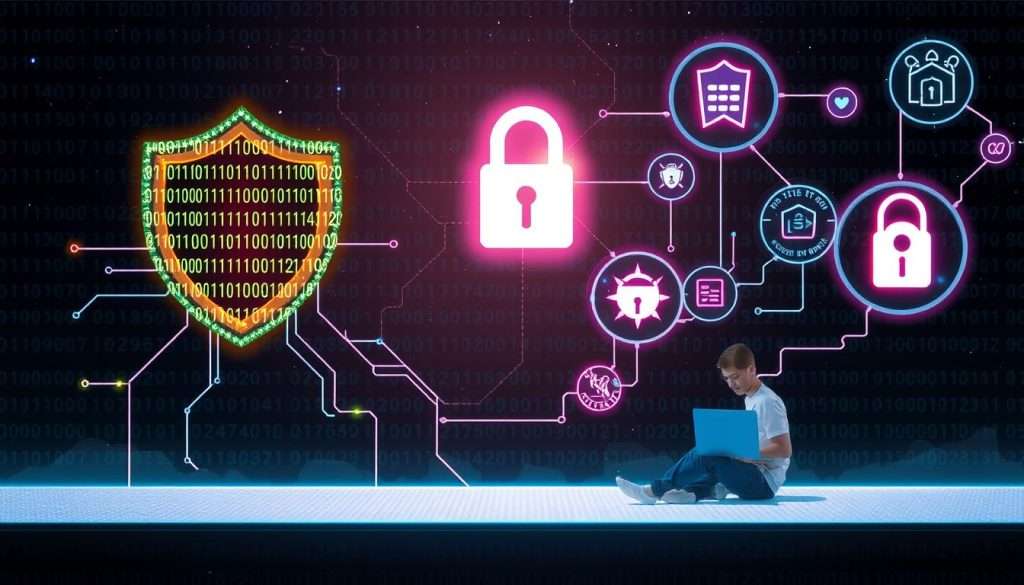
Conclusion
Data security is very important. We’ve talked about many ways to keep your personal data safe. This includes using strong passwords, encryption, and safe browsing.
By following these tips, you can lower your risk of cyber attacks. It’s crucial to stay safe online.
Protecting yourself online means more than just using security measures. This also requires staying updated on newly arising threats. As technology changes, so do the ways hackers attack us.
Learning about new security practices is key. It helps you protect your digital life and keep your information safe.
Keeping your data safe is a constant effort. Being proactive and careful helps make the internet safer for everyone. By following these steps, you can protect your data and keep your digital identity secure.
FAQ
What strategies can be used to effectively safeguard personal information online?
To keep your data safe online, start with strong passwords. Also, use two-factor authentication. Be mindful about the type of information you share on social media to maintain privacy and security.
Keep your software up to date. This helps protect your personal information.
How can I improve my online privacy protection?
Use secure browsers like Mozilla Firefox or Brave. VPNs can also hide your online activity. Adjust your social media privacy settings too.
These steps help keep your data safe and reduce the risk of unauthorized access.
How should I respond if I suspect my data has been compromised?
If you think your data has been breached, change your passwords right away. Watch your accounts for any odd activities.
Set up alerts for any unauthorized transactions. Tell your bank and online service providers about any suspicious activity.
Why is data encryption important?
Encrypting data ensures that it remains inaccessible without the correct decryption key. This provides robust protection and makes it challenging for hackers to access your information.
How can I safeguard my sensitive information on social media?
On social media, set your privacy settings to control who sees your info. Be careful of scams and phishing. Don’t share too much personal stuff.
What are some data protection measures I should implement at home?
Secure your home Wi-Fi by using a complex and unique password to protect your network. Use firewalls for extra protection. Update your routers and devices often to stay safe.
Can using security apps help protect my mobile device?
Yes, good security apps can fight off malware and unauthorized access. Keep these apps and your device’s software up to date for better security.
How often should I monitor my accounts for security?
Check your accounts weekly for any odd activity. Setting up alerts for transactions helps you stay on top of your financial security.
What are the signs of a data breach I should look for?
Watch for unexpected password resets, unauthorized transactions, or account lockouts. If you see these, act fast to protect your accounts.
How can I recognize secure websites while browsing?
Verify that the URL starts with ‘https://’ and look for a padlock icon in the browser, indicating a secure connection.”

This article provides highly effective guidance on protecting personal data. It discusses important topics such as the significance of using strong passwords, regular software updates, and data encryption in great detail. The advice on adjusting privacy settings on social media and being aware of phishing attacks is particularly relevant. By following these recommendations, we can ensure the security of our personal information and protect ourselves from cyber threats.